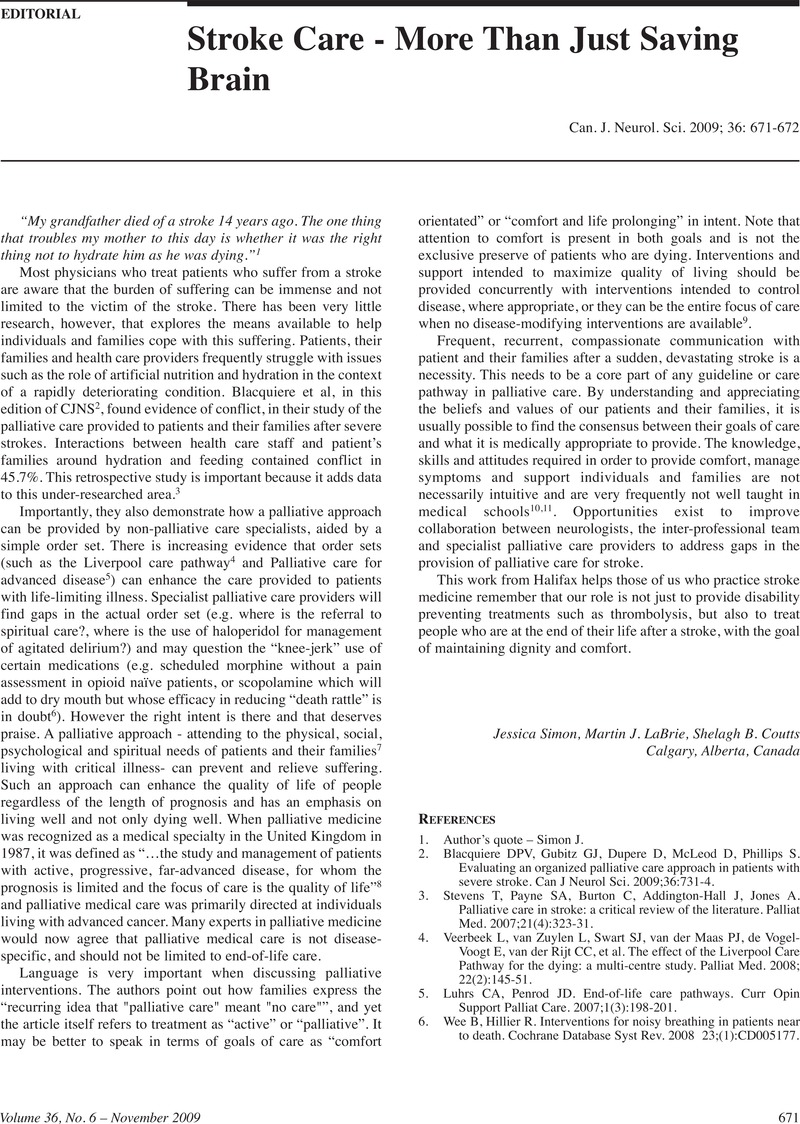No CrossRef data available.
Article contents
Stroke Care - More Than Just Saving Brain
Published online by Cambridge University Press: 02 December 2014
Abstract
An abstract is not available for this content so a preview has been provided. As you have access to this content, a full PDF is available via the ‘Save PDF’ action button.

- Type
- Other
- Information
- Copyright
- Copyright © The Canadian Journal of Neurological 2009
References
1.Author’s quote - Simon, J.Blacquiere, DPV, Gubitz, GJ, Dupere, D, McLeod, D, Phillips, S.Evaluating an organized palliative care approach in patients with severe stroke. Can J Neurol Sci. 2009;36:731–4.Google Scholar
2.Stevens, T, Payne, SA, Burton, C, Addington-Hall, J, Jones, A.Palliative care in stroke: a critical review of the literature. Palliat Med. 2007;21(4):323–31.Google Scholar
3.Veerbeek, L, van Zuylen, L, Swart, SJ, van der Maas, PJ, de Vogel-Voogt, E, van der Rijt, CC, et al.The effect of the Liverpool Care Pathway for the dying: a multi-centre study. Palliat Med. 2008;22(2):145–51.CrossRefGoogle ScholarPubMed
4.Luhrs, CA, Penrod, JD.End-of-life care pathways. Curr Opin Support Palliat Care. 2007;1(3):198–201.Google Scholar
5.Wee, B, Hillier, R.Interventions for noisy breathing in patients near to death. Cochrane Database Syst Rev. 2008 23;(1):CD005177.Google Scholar
6.World Health Organization. Geneva. WHO definition of palliative care. [updated 2009; cited 2009 Sept 4]. Available from http://www.who.int/cancer/palliative/en/Google Scholar
7.Doyle, B, Hanks, G, Cherny, N, Calman, K.Section 1: introduction. In: Doyle, B, Hanks, G, Cherny, N, Calman, K, editors. Oxford textbook of palliative medicine. Oxford: Oxford University Press; 2005. p. 1.Google Scholar
8.Ferris, FD, Balfour, HM, Bowen, K, Farley, J, Hardwick, M, Lamontagne, C, et al.A model to guide hospice palliative care: based on national principles and norms of practice. 2005 August [cited 2009 Sept 4]. Available from http://www.chpca.net/resource_doc_library/model_to_guide_hpc/A+Model+to+Guide+Hospice+Palliative+Care+2002-URLUpdate-August2005.pdfGoogle Scholar
9.Ostgathe, C, Voltz, R, Nauck, F, Klaschik, E.Undergraduate training in palliative medicine in Germany: what effect does a curriculum without compulsory palliative care have on medical students’ knowledge, skills and attitudes? Palliat Med. 2007;21(2):155–6.Google Scholar
10.Pereira, J, Pautex, S, Cantin, B, Gudat, H, Zaugg, K, Eychmuller, S, et al.Palliative care education in Swiss undergraduate medical curricula: a case of too little, too early. Palliat Med. 2008;22(6):730–5.Google Scholar


